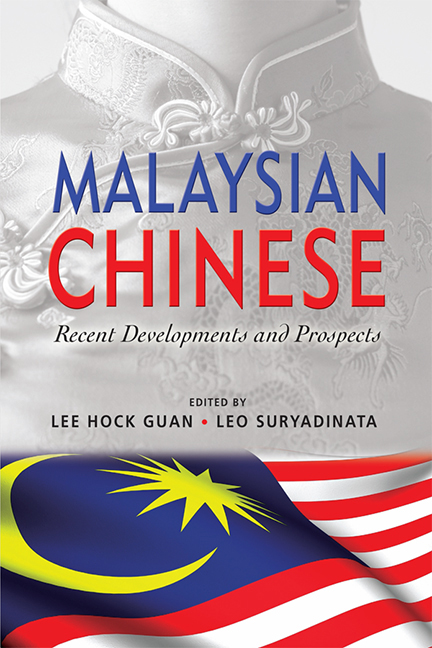Book contents
- Frontmatter
- Contents
- Preface
- Contributors
- Glossary
- Introduction
- 1 Malaysia: Ethnicity, Nationalism, and Nation Building
- 2 Being Muslim and Chinese in Malaysia
- 3 Quo Vadis: The Chinese in Malaysia
- 4 At a Crossroads: Malaysia's Coalition Politics and Chinese-based Political Parties
- 5 The End of Chinese Malaysians’ Political Division? The March 8 Political Tsunami and Chinese Politics in Penang, Selangor, and Perak
- 6 Forced to the Periphery: Recent Chinese Politics in East Malaysia
- 7 The New Malaysian Economic Agenda: Some Preliminary Observations
- 8 The Old And New Malaysian Chinese Language Press, with Special Reference to the 12th General Election
- 9 Education of the Chinese in Malaysia
- Index
3 - Quo Vadis: The Chinese in Malaysia
Published online by Cambridge University Press: 21 October 2015
- Frontmatter
- Contents
- Preface
- Contributors
- Glossary
- Introduction
- 1 Malaysia: Ethnicity, Nationalism, and Nation Building
- 2 Being Muslim and Chinese in Malaysia
- 3 Quo Vadis: The Chinese in Malaysia
- 4 At a Crossroads: Malaysia's Coalition Politics and Chinese-based Political Parties
- 5 The End of Chinese Malaysians’ Political Division? The March 8 Political Tsunami and Chinese Politics in Penang, Selangor, and Perak
- 6 Forced to the Periphery: Recent Chinese Politics in East Malaysia
- 7 The New Malaysian Economic Agenda: Some Preliminary Observations
- 8 The Old And New Malaysian Chinese Language Press, with Special Reference to the 12th General Election
- 9 Education of the Chinese in Malaysia
- Index
Summary
A larger than expected swing against the ruling coalition Barisan Nasional (BN) in the March 2008 election altered the political landscape of Malaysia to an extent that few had thought possible. The opposition Pakatan Rakyat gained more than a third of the parliamentary seats, thus denying the ruling BN a two-third majority for the first time. Five large and important states fell to the opposition, and these include Penang, Selangor, Perak, and Kedah. In this election there had been a significant shift of Chinese votes against the ruling BN. Most observers, including opposition leader Lim Kit Siang, acknowledged that the people mostly voted not for the opposition, but against the BN. Non-Malay voters were critical of non-Malay parties within the BN for not defending their interests and there was a strong underlying protest against what non-Malays saw as UMNO's display of overwhelming political power and arrogance. There was also the waving of an unsheathed keris by UMNO Youth in the last two UMNO General Assembly and this particularly dismayed the non-Malays. Given the fact that March 2008 was a significant watershed in Malaysian politics, this chapter looks at how the political changes could affect the politics of the Chinese and the future of this community.
Since the country's Independence in 1957, Malaysian politics have incrementally been dominated by the BN. But it is UMNO that is dominant and this is reflected in the power relations of the various institutions in the country. Within the Executive, UMNO prevails over the other BN component parties and the Executive is seen as overriding the judiciary and the legislature, and a federal government exercising power over the states, including Sabah and Sarawak. It is UMNO that decides major national policies and key government positions in the country. The prime minister, deputy prime minister, and senior ministers come from UMNO and proceedings of the party's general assemblies are followed more closely by the public than parliamentary sittings.
As the March 2008 election approached there were openly voiced criticisms about the government's ability to deal with the increasing social, economic, and political problems in the country.
- Type
- Chapter
- Information
- Malaysian ChineseRecent Developments and Prospects, pp. 45 - 69Publisher: ISEAS–Yusof Ishak InstitutePrint publication year: 2011

